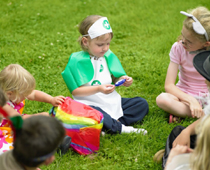
Ask the AI Tutor
Need help with Punctuation? Ask our AI Tutor!
AI Tutor - Lucy
Connecting with Tutor...
Please wait while we establish connection

See if you can get top marks in this quiz about punctuation.
Punctuation
Punctuation helps readers understand how a sentence should sound. This KS2 English quiz teaches the purpose of different punctuation marks in writing.
To see a larger image, click on the picture.
1 .
Correct the punctuation of the following sentence.
I went to the shop to buy chocolate crisps popcorn and juice
I went to the shop to buy chocolate crisps popcorn and juice
I went to the shop to buy chocolate, crisps, popcorn and juice.
I went to the shop to buy, chocolate, crisps, popcorn and juice.
I went to the shop to buy chocolate, crisps, popcorn, and juice.
I went to the shop, to buy chocolate crisps popcorn and juice.
Commas are used to separate items in a list. The last two items, however, are joined by an 'and' and have no comma.
2 .
Correct the punctuation of the following sentence.
stop shouted the security guard
stop shouted the security guard
"Stop! shouted the security guard"
"Stop" shouted the security guard!
"Stop," Shouted the security guard.
"Stop!" shouted the security guard.
The rules for dialogue are complex - for extra practise, try the Direct Speech quiz.
3 .
Correct the punctuation of the following sentence.
after three weeks of blazing sunshine we were happy to see the rain
after three weeks of blazing sunshine we were happy to see the rain
After three weeks of blazing sunshine we were happy to see the rain.
After three weeks of blazing sunshine, we were happy to see the rain.
After, three weeks of blazing sunshine, we were happy to see the rain.
After three weeks of blazing sunshine we were happy, to see the rain
The phrase 'After three weeks of blazing sunshine' needs a comma to separate it from the main clause 'we were happy to see the rain'.
4 .
Correct the punctuation of the following sentence.
Sally who lives next door has just come back from her holiday in Greece
Sally who lives next door has just come back from her holiday in Greece
sally who lives next door has just come back from her holiday in Greece.
Sally who lives next door has just come back, from her holiday in Greece.
Sally, who lives next door has just come back from her holiday in Greece
Sally, who lives next door, has just come back from her holiday in Greece.
The clause 'who lives next door' adds extra information about Sally.
5 .
Correct the punctuation of the following sentence.
what are you planning for the party
what are you planning for the party
What are you planning for the party.
What are you planning for the party?
what are you planning for the party?
What are you, planning for the party?
All sentences need a capital letter at the beginning and either a full stop, question mark or exclamation mark at the end.
6 .
Correct the punctuation of the following sentence.
they were determined to see the concert
they were determined to see the concert
They we're determined to see the concert.
They were determined to see the concert
They were determined to see the concert.
They were determined, to see the concert.
Forgetting capital letters and full stops is a very common mistake.
7 .
Correct the punctuation of the following sentence.
i didn't really want to go shopping but my mother made me come with her
i didn't really want to go shopping but my mother made me come with her
I, didn't really want to go shopping, but my mother made me come with her.
I didn't really want to go shopping but my mother made me come with her.
I didn't really want to go shopping, but my mother made me come with her.
I didn't really want to go shopping but my mother made me come, with her.
Two separate sentences such as 'I didn't really want to go shopping' and 'My mother made me come with her' can be joined by using such words as 'but' or 'yet'. A comma should come before the conjunction in this case.
8 .
Correct the punctuation of the following sentence.
Brendan likes playing football riding his bike and swimming
Brendan likes playing football riding his bike and swimming
Brendan, likes playing football, riding his bike and swimming.
Brendan likes playing football, riding his bike, and, swimming.
Brendan likes playing, football, riding, his bike, and, swimming.
Brendan likes playing football, riding his bike and swimming.
Check your work carefully for proper punctuation.
9 .
Correct the punctuation of the following sentence.
There seemed to be hundreds of ice cream flavours in the end I chose vanilla
There seemed to be hundreds of ice cream flavours in the end I chose vanilla
There seemed to be hundreds of ice cream flavours, in the end, I chose vanilla.
There seemed to be hundreds of ice cream flavours in the end, I chose vanilla.
There seemed to be hundreds of ice cream flavours, in the end I chose vanilla.
There seemed to be hundreds of ice cream flavours; in the end, I chose vanilla.
If they are on a related subject, two complete sentences can be joined by a semicolon instead of a connective/conjunction.
10 .
Correct the punctuation of the following sentence.
the rain which was unexpected completely ruined the picnic
the rain which was unexpected completely ruined the picnic
The rain, which was unexpected, completely ruined the picnic.
The rain which was unexpected completely ruined the picnic.
The rain which was unexpected, completely ruined the picnic.
The rain which was unexpected completely ruined, the picnic.
'The rain completely ruined the picnic' would be a complete sentence. The clause 'which was unexpected' is additional information about the rain and should be set apart with a pair of commas.
**Unlimited Quizzes Await You! 🚀**
Hey there, quiz champ! 🌟 You've already tackled today's free questions.
Ready for more?
Ready for more?
🔓 Unlock UNLIMITED Quizzes and challenge yourself every day. But that's
not all...
not all...
🔥 As a Subscriber you can join our thrilling "Daily Streak" against other
quizzers. Try to win a coveted spot on our Hall of Fame Page.
quizzers. Try to win a coveted spot on our Hall of Fame Page.
Don't miss out! Join us now and keep the fun rolling. 🎉
**Unlimited Quizzes Await You! 🚀**
Hey there, quiz champ! 🌟 You've already tackled today's free questions. Ready for more?
🔓 Unlock UNLIMITED Quizzes and challenge yourself every day. But that's not all...
🔥 As a Subscriber you can join our thrilling "Daily Streak" against other quizzers. Try to win a coveted spot on our Hall of Fame Page.
Don't miss out! Join us now and keep the fun rolling. 🎉
















